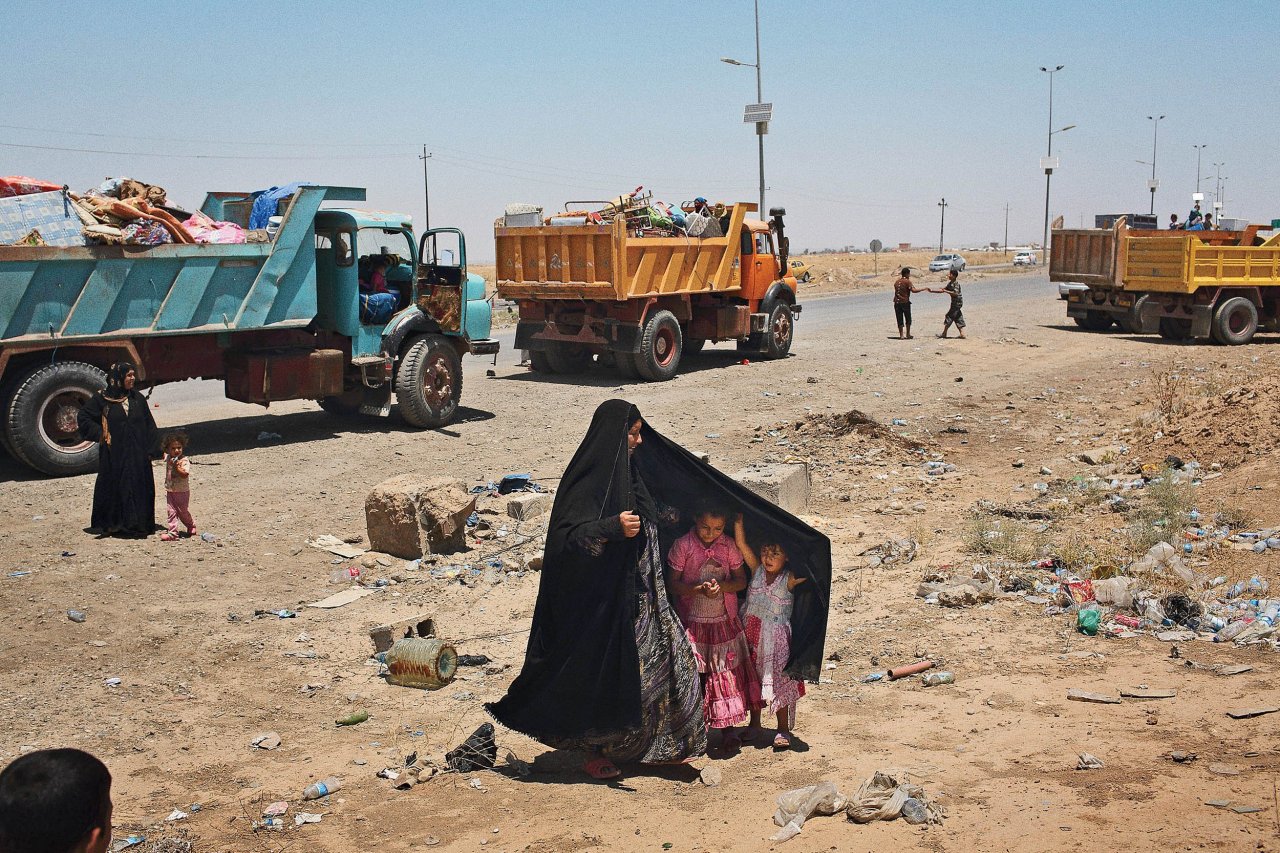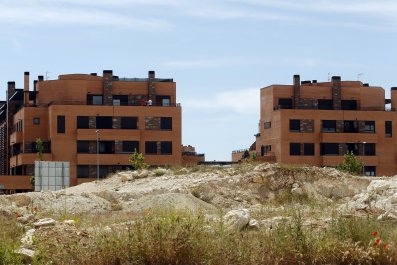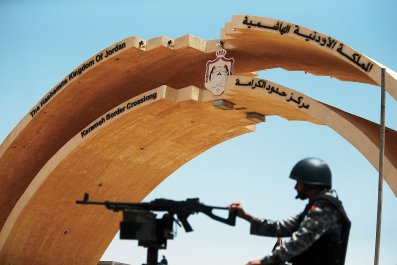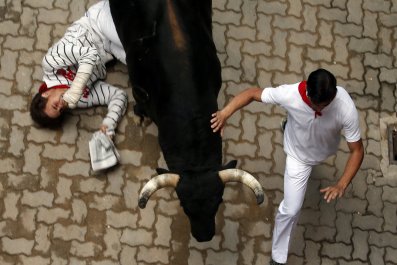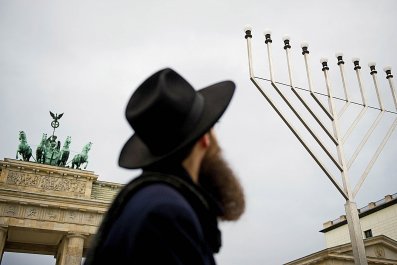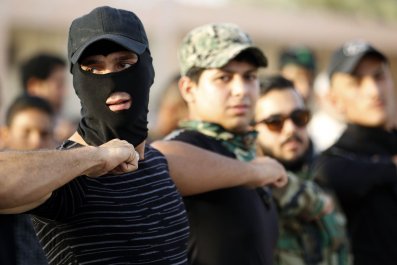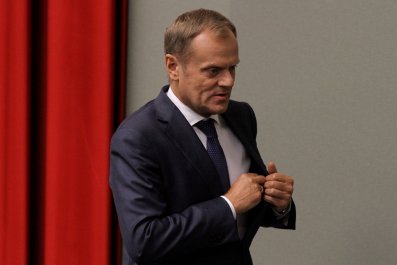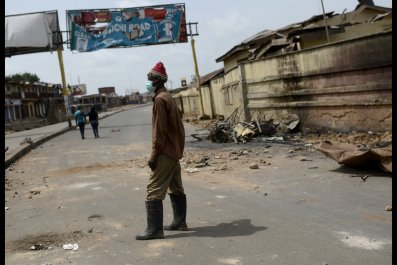In Baghdad, they call it "zero hour."
It is the moment Iraqis believe is coming soon, when the Islamic State of Iraq and Syria (ISIS), which now controls large parts of the north and west of the country, arrives in their capital.
According to experts there, if Baghdad falls, it will not be from a full-frontal attack, in which the militants rush forward and raise their Black Flag defiantly. Instead, they will win the way rebels in Sierra Leone took Freetown. And the way Bosnian Serbs ringed Sarajevo before shelling it. Their conquest will come from a creeping, steady infiltration designed to break the will of the population.
An estimated 80 percent of Baghdad's population is Shia, so it would be difficult for ISIS to overrun it in a conventional way. "It would be very hard to take Baghdad," says Adnan Hussein, editor of the city's Almada newspaper. "What is going on now is psychological warfare to frighten people."
"They will not take central Baghdad," says Hisham al-Hashimi, a security strategist there. "I am not even sure they want it." Instead, he says, the Islamic insurgents will take "the Baghdad belt"—a series of towns ringing the city, from which they will wage their brutal war. The main Baghdad belt towns are Tarmiyah and Taji, to the north, and Abu Ghraib, site of the notorious prison, to the west. The southwest towns of Yusufiyah, Lutufiyah and Mahmudiyah are also vulnerable, as is Salman Pak to the southeast.
According to military sources, ISIS already has "footprints"—agents on the ground—in those towns, which have increased in number since January due to the insurgency in neighboring Anbar province. There are also grave fears over the fate of Mahmudiyah, a former Al-Qaeda stronghold on the road to Karbala, one of the cities that are sacred to the majority Shias, who make up the Baghdad government.
Caches of ISIS weapons have been discovered in towns on the Tigris River, southeast of Baghdad. Once the Islamists secure those and other crucial posts, according to military sources, "DAISH"—the Arabic name for the insurgents— is expected to activate its "sleeper" Sunni cells, which run like an artery through the city.
According to al-Hashimi, their goal is to intimidate and psychologically wound the population, instill fear, make them abandon their homes and leave the territory free for ISIS to set up an Islamic state in Baghdad.
Irish separatist group the Provisional Irish Republican Army used similar tactics in London in the 1970s and 1980s, when it attempted to intimidate Londoners with the constant threat of bombs planted in crowded public places, like stores and restaurants. "When the IRA started to bomb the mainland of England, they only had to place one or two bombs—and that induced fear in the general population," says one Western security expert in Baghdad who has worked in Iraq since 2003. "And that is the aim of terrorism. The IRA used to give coded messages to the police as an early message. Why? It's to instil fear in people more than the bomb itself."
Hussein says hundreds of thousands have fled Baghdad in the past two weeks. "Because they don't know what is going to happen. That is fear. That is terrorism."
General Saad Maan Ibrahim, the Iraqi Army's Baghdad Operations Command spokesman, says Iraqi security forces are eradicating ISIS sleeper cells. "We are getting good information," he says. "We have captured two cells this week." He says there have been more than 100,000 calls to a hot line to which civilians can report suspicious activity. "Or people come in and tell us face to face what is going on. They see it as their duty. They are not afraid."
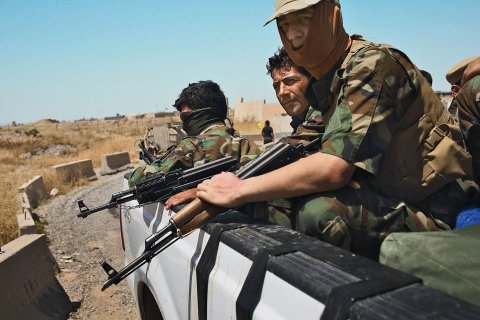
"The Missing" Room
While ISIS surges through the north and west of the country, life is becoming increasingly desperate in places under its control. In Mosul, overrun on June 10, most stores are closed, but the ones that are operating are selling their wares at exorbitant prices. Tinned meat is said to cost three times the usual price—from 1,000 Iraqi dinars (86 cents) before the ISIS invasion to 3,000 dinars ($2.58) today.
"People are buying food that is expired because it is cheaper," says Sallama al-Khafaji, a former member of parliament and a board member of the Iraq High Commission for Human Rights. "Worse is the situation of the sick. If they need medicine, they risk getting poisoned, because there is no electricity in the pharmacies. So the drugs they buy are not good."
I met al-Khafaji 10 years ago in Baghdad, shortly after she lost her 17-year-old son and her sister to a car bomb. Then (as now) she was heavily guarded, and when she leaves her home or office, she travels in a car that automatically blocks electronic signals between a detonator switch and a bomb. "My son would have been 27 this year," she reminds me.
But tragedy has not stopped al-Khafaji, whose husband is an adviser to embattled President Nouri al-Maliki. She still believes in a multicultural Iraq, and she now spends her days tracking the ISIS abuses against civilians. "When people from Mosul talked to me," she says, "they said they saw these men with 'long hair and short clothes'—that is how they describe ISIS to me—and they ran. They took nothing but the clothes on their backs. Some did not even put on their shoes. Some forgot to take their identification cards."
The civilians fleeing the terror, she says, are Sunni, Shia and Christians. Recent attacks against Christians have been particularly severe, with the first stories of rape emerging. Al-Khafaji says one Christian father killed himself after members of ISIS raped his daughter.
"It's starting," she says. "The crimes against women. They came in the houses in Mosul and took the clothes of women that were un-Islamic and threw them on the street. They tore down the statues of Our Lady."
"People are afraid," al-Khafaji says, "because they just don't know their future."
William Warda, who works for Hammurabi Human Rights Organization in Baghdad and is active with the Assyrian Democratic Movement, confirms this. "Never have Iraqi Christians been so insecure," he says. "In Baghdad, they feel they are at the mercy of the majority [Shias] to protect them. In the north, they have to rely on the peshmerga [Kurdish fighters] to protect them. In fact, they have no idea who will protect them.
"Unlike Lebanese Christians, we have not had our own militia since 1933," he adds. "The future of the Christians in the Middle East is very black. But we cannot run away from Iraq. We have to resist. We are urging the Christian population to stay. Fleeing is not the solution."
But it is not just the Shias and the Christians who fear for their lives. In Baghdad it is the Sunnis, too, who are terrified, even though ISIS is largely a Sunni army. This time, the Sunnis fear the Shia death squads who are once again operating with impunity. One Western diplomat says, "They never really went away."
In the Baghdad morgue, Dr. Munjid al-Rezali, the chief pathologist and former director, leads us to a small room called "The Missing." Inside, on a hard-backed chair, sits Sommaya, a Sunni woman in her 40s. She says she is here to identify the body of her younger brother, Abdullah, an engineer she says was so gentle "he would not hurt anyone."
Al-Rezali says that, day by day, there is an increase in bodies found on the street—and they are all male Sunnis. In a two-day period, 72 bodies were delivered to the morgue, most bearing the hallmarks of torture, with each Shia militia leaving behind its individual grotesque signature. One militia, for instance, likes to put a flame to nylon, then drip the liquid onto the naked bodies of its victims.
Unlike the 2006–2007 ethnic cleansing of Sunnis here—"the blood years," as one Sunni woman called it—the Sunni men in the morgue are not prominent members of the communities; they appear to have been average Sunni citizens in mixed neighborhoods. They are being targeted because they symbolize what the international community wants: a multicultural Iraq.
Loss at the Deepest Level
The Shia death squads—in this case, well-dressed men, not the clichéd picture of militiamen dressed in black with balaclavas over their faces—arrived at Sommaya's southwest Baghdad home on a quiet Sunday, looking for Abdullah. They brandished pistols and searched the house. Sommaya says the men, who described themselves as "officials," said they would "rape me if I did not bring out my brother." Eventually, the militiamen found him and dragged him away.
The pathologists say Abdullah was killed one hour after he was taken from his home; his body was dumped behind a nearby school.
As five video screens flash photos of the bodies brought into the morgue that day, Sommaya recognizes her brother. He is wearing only shorts, and his head is a pool of blood. There are bruises on his chest, his arms and his torso, where it appears he was kicked or punched or beaten with a hard object. The blood is clotted where he was shot in the head. The string that tied his hands into a stress position is still in place. Sommaya collapses and sobs, the wails of a broken woman who understands loss at the deepest level.
On the way out of the morgue, we pass five men in dirty yellow jumpsuits, squatting, their hands tied behind them. They are blindfolded. They are all young and look drained of life, as if they know what lies ahead of them. Heavily armed soldiers with steely eyes guard them. As we pass, the prisoners seem aware of people standing behind them, but they do not move, as though they are afraid that any attempt to communicate will lead to a reprisal.
Officially, they are here for questioning. They are suspected ISIS terrorists. What will happen to them? Will they live or die? Will they be tortured to death and dumped in mass graves? Like the fate of Baghdad, which has entered a long and brutal and probably bloody summer, their future is unclear.



